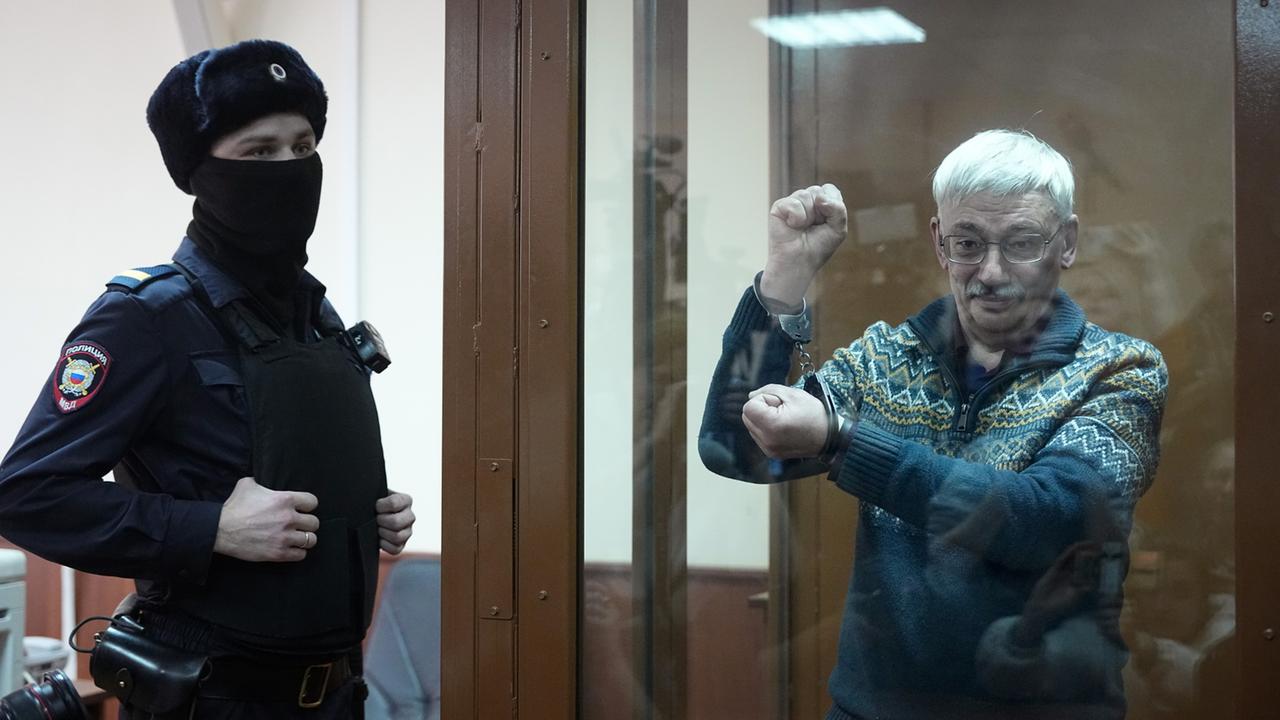Russian human rights activist Orlov has been imprisoned for two years and six months. In his closing words he reminds us of the uncontrollability of history. His supporters see the verdict as a message.
The bailiffs are masked, they hide their faces behind black masks, and one of them wears dark mirrored glasses. This is unusual even for Russian trials – apparently the men do not want to be recognized.
The hall is filled to the last seat. Oleg Orlov, co-founder of the human rights organization Memorial, which was awarded the Nobel Peace Prize and is now banned in Russia, sits next to his lawyer and smiles into the cameras.
Today is the verdict, this time he doesn't have Kafka with him. During the trial he had ostentatiously read a thick copy of Kafka's “Trial”. The packed travel bag is next to his chair.
Oleg Orlov with his lawyer in the courtroom. In an initial judgment in this matter, he was sentenced to a fine of around 3,000 euros. That wasn't enough for the public prosecutor's office and the proceedings were reopened.
A wall of ambassadors
Friends and supporters are there, Orlov's wife, international media. And ambassadors from many countries in Europe and the world, from New Zealand to Portugal. The EU ambassador came, as did Alexander Graf Lambsdorff, the representative of Germany.
They were all there yesterday, on the day the prosecutor and defense attorney made their pleas. They sit directly opposite the judge; from her perspective, the diplomats must appear like a wall of dark suits and costumes.
Yesterday, the public prosecutor's office demanded two years and eleven months in prison for discrediting the army: In 2022, Orlov sharply criticized Russia's governance and the war against Ukraine in an article. In the first judgment in this matter, Orlov was sentenced to a fine of around 3,000 euros. That wasn't enough for the public prosecutor's office and the proceedings were reopened.
In her speech yesterday, the prosecutor repeatedly quoted the title of Orlov's article: “They wanted fascism, and they got it.” The author, she said, was stirring up hatred against his own country with his words.
Remembering history
Later, when Oleg Orlov had the opportunity to say a final word, she sat in front of him with her arms crossed and her face impassive – it was impossible to tell whether his words had touched her, and the judge didn't show anything either.
In his last word, Orlov addressed the two of them directly, looked at them, and asked them whether they were not afraid of the developments. Did they want their children and grandchildren to grow up in an anti-utopia? And then a question that could be understood as a warning, but also as a threat:
“Don't you ever think about the fact that sooner or later the roller of repression will roll over those who initiated it and continue to push it? That's how it has often been in history.”
Orlov's supporters applaud
Orlov alludes to Stalin's “purges”, in which even former Stalin confidants fell victim. It is the era of Russian and Soviet history that he, who has spent his life working on human rights, is very familiar with.
And he refers to the German post-war period: After the defeat of the National Socialists, says Orlow, the former executors of Nazi legislation were themselves convicted.
The judge and prosecutor sat unmoved. When Orlov ended his lecture with the words “I regret nothing,” someone loudly shouted “Bravo.” His supporters in the hall applauded, the bailiffs urged calm. Immediately afterwards, the judge surprisingly postponed the verdict for a day.
Quickly read verdict
Today, for the verdict, the diplomats are back and, it seems, even more journalists than yesterday. Judge Astachowa read out the verdict quickly and without much preamble – two years and six months in prison. This means she remains five months below the public prosecutor's demands. The ruling takes effect immediately.
In front of dozens of running cameras, the two masked bailiffs take Orlov into their midst, handcuff him and lead him into the barred glass cage of the courtroom.
From there he is given the opportunity to exchange a few words with his wife Tatjana: “You promised me,” he says through the window. “Yes,” she answers – “I stay strong.” Orlov is seventy years old.
The wife of human rights activist Oleg Orlov, Tatjana Kasatkina, in front of the courthouse.
“This is a signal to all of us”
All those who didn't make it into the courtroom are waiting outside the courthouse. “This is a signal to all of us,” says a family friend: “Don't you dare be against what we do. It's a judgment against words, against an opinion. We should understand what is threatening us all. “
A young woman with brightly colored hair has tears in her eyes. It's not just about Oleg, it's also about her own future, she says. But I'm not leaving, I'm staying in my country. I know that one day everything will change here. And I want to be there.”
Björn Blaschke, ARD Moscow, currently Tbilisi, tagesschau, February 27, 2024 11:56 a.m





